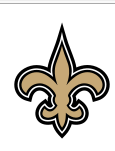
| New Orleans Saints | |||
| Current season | |||
|
Established 1967 Play in Mercedes-Benz Superdome New Orleans, Louisiana Headquartered in Metairie, Louisiana |
|||
|
|||
| League/conference affiliations | |||
|
National Football League (1967–present) Eastern Conference (1967–1969) Capitol Division (1967; 1969) Century Division (1968) National Football Conference (1970–present) NFC West (1970–2001) NFC South (2002–present) |
|||
| Current uniform | |||
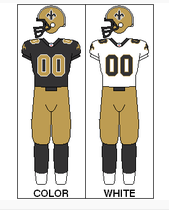 |
|||
| Team colors |
Black, Old gold, White |
||
| Fight song | "When the Saints Go Marching In" | ||
| Mascot | Gumbo the dog and Sir Saint | ||
| Personnel | |||
| Owner(s) | Tom Benson and Rita Benson LeBlanc | ||
| General manager | Mickey Loomis | ||
| Head coach | Sean Payton | ||
| Team history | |||
| New Orleans Saints (1967–present) | |||
| Team nicknames | |||
| Black and Gold, The Who Dats Boys, The Bless You Boys, The Cajun Kids, The Beasts of The Bayou, the Simon Templars | |||
| Championships | |||
|
League championships (1) Super Bowl Championships (1) 2009 (XLIV) |
|||
|
Conference championships (1) NFC: 2009 |
|||
|
Division championships (5) NFC West: 1991, 2000 NFC South: 2006, 2009, 2011 |
|||
| Playoff appearances (9) | |||
| NFL: 1987, 1990, 1991, 1992, 2000, 2006, 2009, 2010, 2011 | |||
| Home fields | |||
|
Tulane Stadium (1967–1974) Mercedes-Benz Superdome (1975–2004, 2006–present) a.k.a. Louisiana Superdome (1975–Oct. 2011) Temporary stadiums in 2005 due to the effects of Hurricane Katrina: Tiger Stadium (Four Games) Alamodome (Three Games) Giants Stadium (One Game) |
|||
The New Orleans Saints are an American professional football franchise based in New Orleans, Louisiana. They are currently members of the Southern Division of the National Football Conference(NFC) of the National Football League (NFL). The team was founded by John W. Mecom, Jr. and David Dixon and the city of New Orleans. The Saints began play at Tulane Stadium in 1967.
The name "Saints" is an allusion to November 1 being All Saints Day in the Catholic faith, New Orleans' large Catholic population, and the spiritual When the Saints Go Marching In, which is strongly associated with New Orleans. The team's primary colors are old gold and black; their logo is a simplified fleur-de-lis. They played their home games in Tulane Stadium through the 1974NFL season. The following year, they moved to the new Louisiana Superdome (now the Mercedes-Benz Superdome, since Mercedes-Benz has purchased the stadium's naming rights through the 2021 NFL season).[1]
For most of their first 20 years, the Saints were barely competitive, only getting to .500 twice. In 1987, they finished 12-3 (their first-ever winning season) and made the playoffs for the first time in franchise history, but lost to the Minnesota Vikings 44-10. The next season of 1988 would end with a 10-6 record, proving that the Saints were a competitive team, and that 1987 was not a fluke. The Saints defeated the St. Louis Rams 31-28 in 2000 to notch their first-ever playoff win.
In 2005, Hurricane Katrina devastated New Orleans and, indeed, much of the Gulf Coast region. The Superdome was used as an emergency temporary shelter for displaced residents. The stadium suffered damage from the hurricane (notably from flooding and part of the roof being torn off as well as internal damage), and from lack of available facilities. The Saints were forced to play their first scheduled home game against the New York Giants at Giants Stadium in East Rutherford, New Jersey (the Giants' home stadium); other home games were rescheduled at the Alamodome in San Antonio, Texas or Tiger Stadium in Baton Rouge, Louisiana. During the season, it was rumored that Saints owner Tom Benson might deem the Superdome unusable and seek to legally void his contract and relocate the team to San Antonio, where he has business interests. Ultimately, however, the Superdome was repaired and renovated in time for the 2006 season at an estimated cost of $185 million. The New Orleans Saints' first post-Katrina home game was an emotionally-charged Monday Night Football game versus their division rival, the Atlanta Falcons. The Saints, under rookie head coach Sean Payton and new quarterback Drew Brees, defeated the Falcons 23-3, and would go on to notch the second playoff win in franchise history.
The 2009 season was a historic one for the Saints. Winning a franchise-record 13 games, they qualified for Super Bowl XLIV and defeated the AFC champion Indianapolis Colts 31-17. To date, it is the only Super Bowl Championship that they have won, and as it is the only Super Bowl the Saints have appeared in, they are thus one of three NFL teams to win their lone Super Bowl appearance, along with the New York Jets and Tampa Bay Buccaneers.
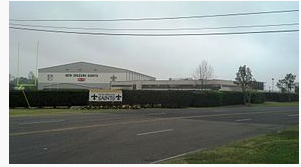
New Orleans Saints Headquarters and Practice Facility
History
Main article: History of the New Orleans Saints
Early history
First the brainchild of local sports entrepreneur Dave Dixon, who also founded the Louisiana Superdome and the USFL, the Saints were actually secretly born in a backroom deal brought about by Congressman Hale Boggs, Senator Russell Long and NFL Commissioner Pete Rozelle. The NFL needed congressional approval of the proposed AFL-NFL merger.[2] Dixon and a local civic group had been seeking a NFL franchise for over 5 years and had hosted record crowds for NFL exhibition games. To seal the merger, Rozelle arrived in New Orleans within a week, and announced on November 1, 1966 that the NFL officially had awarded the city of New Orleans an NFL franchise. The team was named for the great jazz song most identified with New Orleans – "When the Saints Go Marching In", and it was no coincidence that the franchise's official birth was announced on November 1, which is the Catholic All Saints' Day. When the deal was reached a week earlier, Dixon strongly suggested to Rozelle that the announcement be delayed until then. Dixon told an interviewer that he even cleared the name with New Orleans' Archbishop Philip M. Hannan: "He thought it would be a good idea. He had an idea the team was going to need all the help it could get." [3]
Boggs' Congressional committee in turn quickly approved the NFL merger. John W. Mecom, Jr., a young oilman from Houston, became the team's first majority stockholder. The team's colors, black and gold, symbolized both Mecom's and New Orleans' strong ties to the oil. Trumpeter Al Hirt was part owner of the team, and his rendition of "When the Saints Go Marching In" was made the official fight song.
That first season started with a 94 yard opening kickoff return for a touchdown by John Gilliam (No other team in NFL history has ever returned a kickoff for a touchdown on its first attempt as a new franchise), but the Saints lost that game 27–13 to the Los Angeles Rams at Tulane Stadium. Their first season record was 3–11, which set an NFL record for most wins by an expansion team. However, they could not manage to finish as high as second in their division until 1979. The 1979 and 1983 teams were the only ones to even finish at .500 until 1987.
One of the franchise's early bright moments came on November 8, 1970, when Tom Dempsey kicked an NFL record-breaking 63-yard field goal to defeat the Detroit Lions by a score of 19–17 in the final seconds of the game. After standing unmatched for 28 years, this record has been equaled by Jason Elam in 1998, Sebastian Janikowski in 2011, and David Akers in 2012, but has yet to be broken.
In 1980, the Saints lost their first 14 games, prompting local sportscaster Bernard "Buddy D" Diliberto to advise Saints supporters to wear paper bags over their heads at the team's home games; many bags rendered the club's name as the "'Aints" rather than the "Saints."
The Jim Mora era
Current Saints owner Tom Benson acquired the franchise in 1985, and hired Jim Finks as general manager and Jim Mora as head coach. That combination provided the Saints with their first-ever winning record and playoff appearance, going 12–3 in 1987, which had one fewer game than normal due to a players' strike. Another playoff berth would follow in 1991, and the club's first division title came in 1991. During Mora's tenure the Saints made the playoffs four times, with teams marked by strong defenses led by the "Dome Patrol" linebacking corps, but they were never able to win a playoff game. Mora coached the Saints until the middle of the 1996 season, when he stepped down halfway through a 3–13 season. His 93 wins are still a franchise record, and are three more than the Saints won in their entire history prior to his arrival.
The Mike Ditka era
After the end of the 1996 season, ironically as Diliberto had suggested before Mora's resignation, former Chicago Bears coach Mike Ditka was hired to replace Mora. Although this initially generated a lot of excitement among Saints fans, Ditka's tenure ended up being a failure. The Saints went 6–10 in their first two seasons under Ditka (1997 and 1998). During the 1999 NFL Draft, Ditka traded all of his picks for that season, as well as the first-round and third-round picks for the following season, to the Washington Redskins in order to draft University of Texas Heisman Trophy running back Ricky Williams in the first round. Ditka and Williams had a mock wedding picture taken to commemorate the occasion. However, Ditka, most of his coaching staff, and general manager Bill Kuharich were fired at the end of the 1999 season due to the club's 3–13 record.
The Jim Haslett era
Jim Haslett held the post from 2000 to 2005. In his first year, he took the team to the 2000 playoffs but lost to the Minnesota Vikings a week after beating the St. Louis Rams for the team's first ever playoff win. After winning the 2000 NFL Executive of the Year Award, General Manager Randy Mueller was fired between the 2001 and 2002 seasons without explanation by Benson. The Saints failed to make the playoffs in 2001 and 2002, although in the latter year they had the distinction of beating the eventual Super Bowl XXXVII champion Tampa Bay Buccaneers in both of their regular season meetings, only the second team to do so in NFL history.
In 2003, the Saints again missed the playoffs after finishing 8–8. The 2004 season started poorly for the Saints, as they went 2–4 through their first six games and 4–8 through their first twelve games. At that point Haslett's job appeared to be in jeopardy; however, he managed to win the three straight games leading up to the season finale, leaving the Saints in playoff contention in the final week of the season. In week 17, the Saints defeated division rivalsCarolina; however, the Saints needed other results to break their way and when the St. Louis Rams beat the New York Jets the Saints were eliminated despite having beaten the Rams, who finished with the same record. The Rams, Saints, andVikings all were 8–8, with the Rams having a 7–5 conference record, Saints 6–6, and the Vikings 5–7. The Rams received the #1 wild-card due to having the best conference record out of the 3, followed by the Vikings due to the 38–31 loss handed to the Saints in Week 6. Haslett was fired after the 2005 season, in which the Saints finished 3–13 and did not play one regular season contest in New Orleans due to Hurricane Katrina. On January 17, 2006, the Saints hiredSean Payton as their new head coach.
Effect of Hurricane Katrina
Main article: Effect of Hurricane Katrina on the New Orleans Saints
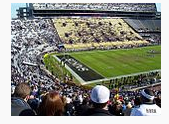
Tiger Stadium was one of the venues that hosted the Saints in 2005.
Due to the damage Hurricane Katrina caused to the Superdome and the New Orleans area, the Saints scheduled 2005 home opener against the New York Giants was moved to Giants Stadium. The remainder of their 2005 home games were split between the Alamodome in San Antonio, Texas, and LSU's Tiger Stadium in Baton Rouge, Louisiana.
The Payton era
2006
For detailed information on the team's 2006 season, see 2006 New Orleans Saints season.
On March 23, the Saints announced that the team's two 2006 preseason games were to be played at Shreveport, Louisiana and Jackson, Mississippi.After a $185 million renovation of the historic stadium, on April 6 the Saints released their 2006 schedule, with all home games scheduled to be played at the Superdome. On September 19, Saints owner Tom Benson announced that the team had sold out the Louisiana Superdome for the entire season with season tickets alone (70,001 seats), a first in franchise history.
The September 25, 2006 home opener, the first home game in New Orleans after Hurricane Katrina, was won by the Saints 23–3 against the Atlanta Falcons, who were undefeated in the 2006 season at that time. The attendance for the game was a sellout crowd of 70,003. Meanwhile, the broadcast of the game was ESPN's highest-ever rated program to date, with an 11.8 rating, and viewership by 10,850,000 homes. It was the most-watched program for the night, broadcast or cable, and was the second-highest rated cable program of all time at the time. Green Day and U2 performed "Wake Me Up When September Ends" and "The Saints Are Coming", respectively, before the game. The game received a 2007 ESPY award for "Best Moment in Sports." The game is remembered by Saints fans for Steve Gleason's blocked punt on the opening series that resulted in a touchdown for New Orleans.
On December 17, 2006, the Saints clinched their third division title and their first NFC South title in franchise history. For the first time in Saints' history, they clinched their NFC South title on their home field. Sean Payton became the second consecutive Saints coach to win a division title in his first season. After the Philadelphia Eagles beat the Dallas Cowboys 23-7 on Christmas Day 2006, the Saints clinched a first-round playoff bye for the first time in franchise history.
After the first-round bye, the Saints beat the Philadelphia Eagles 27–24 in the Superdome in the 2006 Divisional Playoffs. No team had ever had such a poor record in the prior year (3–13) and then gone on to a league or conference championship game since the 1999 St. Louis Rams who advanced to win their first Super Bowl after being 4–12 the season before. Since the Saints' only previous playoff win was in the wild card round, this was the farthest the Saints had ever advanced at the time. The victory was only the second playoff win in team history. The season ended on January 21, 2007 when the Saints lost 39–14 to the Chicago Bears in the NFC Championship game.
2007
Main article: 2007 New Orleans Saints season
The Saints announced that for the second year in a row, the Louisiana Superdome had sold out every ticket for the season.[4] Additionally, all luxury boxes had been sold out for the season.[citation needed] Both of these statistics are particularly surprising given that the city-proper has about 300,000 people or 150,000 fewer people than July 2005 population data (though the metro area still accounts for 1.2 million people).
The first game of the season was against the defending Super Bowl XLI champion Indianapolis Colts. The Saints lost this game, 41–10, and lost their next three games. In one of these three games, against the Tennessee Titans, the Saints lost running back Deuce McAllister for the season with his second career (second time in three seasons) ACL tear. After winning their first game, against the Seattle Seahawks, two weeks later, the team went on a four-game winning streak to bring their record to an even 4–4. After reaching 7–7, the Saints lost their final two games to finish 7–9.
2008
Main article: 2008 New Orleans Saints season
Following a disappointing 7–9 record in the 2007 season, the Saints ended the 2008 season 8–8. Failing to qualify for the post season for the second straight year, the Saints found themselves struggling on defense. The Saints would match the explosive offense they had in the 2006 season, however. Drew Brees ended the 2008 season just 16 yards short of beating Dan Marino's single-season record of 5084 total passing yards. Lance Moore came 72 yards short of his first 1000-yard season.
2009
Main article: 2009 New Orleans Saints season
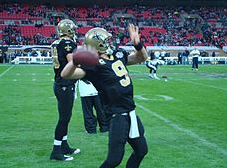
QB Drew Brees was named MVP inSuper Bowl XLIV.
The 2009 season was the team's most successful season, which culminated in the franchise's first league championship win against the Indianapolis Colts in Super Bowl XLIV. After achieving a record of 13–0 with their win over the Atlanta Falcons, it marked the Saints' best start to a season in its franchise history. The result clinched an NFC playoff berth, a bye in the first round of the playoffs. By winning their first 13 games, the Saints also set the record for the longest undefeated season opening (13–0) by an NFC team since the AFL–NFL merger, surpassing the previous record (12–0) held by the 1985 Chicago Bears. However, they would fall victim to the Dallas Cowboys in week 14, going on to end the season with a 3 game losing streak (Saints became the first team to win a Super Bowl after losing its last three regular season games).


